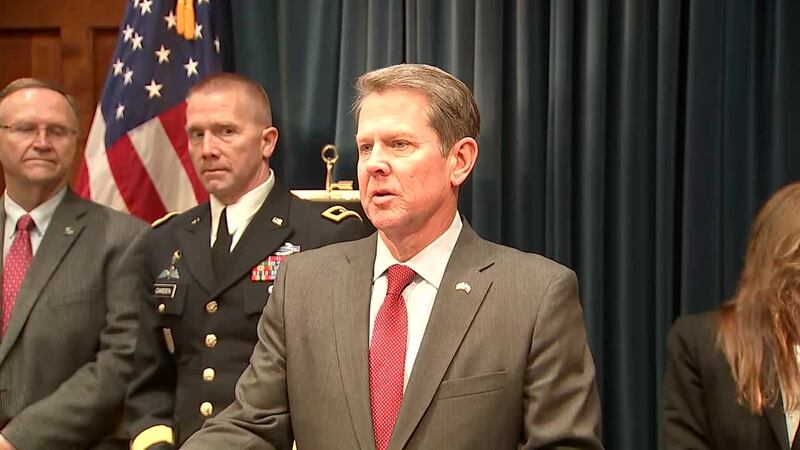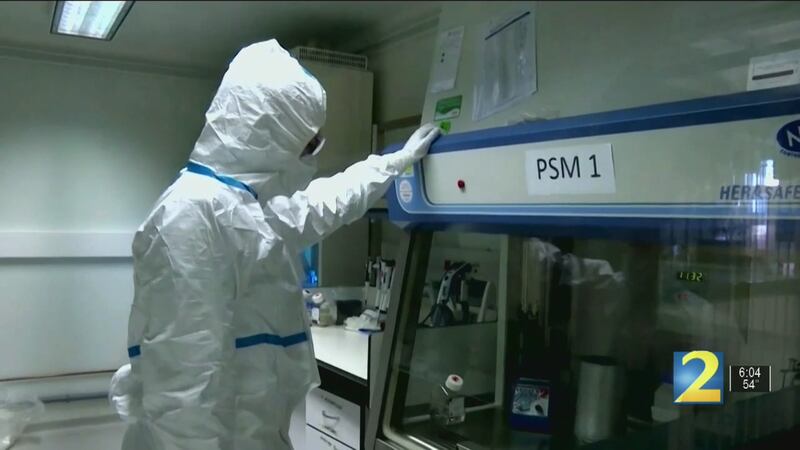ATLANTA — NEW INFORMATION: Georgia coronavirus patients are father, son who traveled to Italy before getting sick
------------
Gov. Brian Kemp confirmed at a late-night news conference Monday that there were two confirmed cases of COVID-19, the coronavirus, in Fulton County.
The Centers for Disease Control and Prevention confirmed the cases to state health officials earlier in the evening.
We’re staying in touch with state officials and medical experts about the cases of coronavirus in Georgia -- Watch Channel 2 Action News for updates on this developing story
"These cases involve two individuals who reside in the same household. One who recently returned from Italy," Kemp said.
[INTERACTIVE MAP: How many people in the US have coronavirus?]
They are currently being kept inside their home with family to help isolate the virus.
The governor urged residents that there is no reason to panic about the announcement.
"Georgians should remain calm. We were ready for today. We have been preparing for weeks now and so far, every development has come forward just as we expected it would," Kemp said.
Kemp said the newly formed state coronavirus task force played a big role in being proactive in this case.
“We thought it was important that we come today and tell you about this even as our epidemiologists are still investigating and find any potential contacts in the community,” Department of Public Health Commissioner Dr. Kathleen Toomey said.
[LIVE UPDATES: Outbreak of coronavirus continues to wane in China]
Toomey praised the patients and physicians in how they handled the cases. She said the man who had returned from Italy, called his doctor complaining of symptoms.
She said the doctor had the two patients enter through separate entrances to the doctor’s office and kept them from as much exposure as possible to other people.
“We got this specimen on Saturday, sent it to the CDC for testing, because they are the ones doing these tests currently, and they turned it around in record time,” Toomey said.
[READ: Coronavirus hitting travel industry hard; estimated to cost billions]
Toomey said the patient did not experience any symptoms until they returned back to metro Atlanta. She said the patients and their family members are being isolated inside their home, are doing well and showing minimal symptoms.
"We will continue to search for any contacts to ensure that we stop any further spread in the community," Toomey said. "We don't want that to go any further."
“The message to the public is still low risk. No local transmission going on and wash your hands and get a flu shot,” Toomey said.
Senators David Perdue and Kelly Loeffler issued a joint statement Monday night saying:
“We’re closely monitoring the cases of coronavirus in Georgia and urge everyone to take extra precautions. Governor Kemp and the Trump Administration are working with us to ensure we keep Georgians healthy and safe. It is of utmost importance that Georgia has the resources necessary to respond accordingly. Fortunately, we have the best and brightest working at the CDC here in Atlanta to continue to help prepare the country.”
Here are some quick facts about the virus:
What is it?
Cornaviruses are similar illnesses to the flu. There are several strains, four of which actually cause the common cold, according to Dr. Cherie Drenzek, a state epidemiologist. Coronaviruses have been spreading in humans for years, and you’ve probably had one without knowing it.
COVID-19 is a novel, or new, strain of coronavirus.
How does the virus spread?
WHO said the virus spreads person-to-person, when someone coughs or sneezes. If someone near you is sick and they cough and sneeze in something, then you touch it, you could be infected.
Dr. Carlos Del Rio, a professor of medical and global health at Emory University, said it appears the coronavirus can stay on a surface for several hours.
Should I panic?
U.S. Surgeon General Jerome Adams said “Caution is appropriate, preparedness is appropriate, panic is not.” Adams said that of the original 14 positive cases of coronavirus, all are recovering or have recovered.
Best Practices:
- Wash your hands often with soap and warm water for at least 20 seconds. If soap and water are not available, use an alcohol-based hand sanitizer.
- Avoid touching your eyes, nose, and mouth with unwashed hands.
- Avoid close contact with people who are sick.
- Stay home when you are sick.
- Cover your cough or sneeze with a tissue, then throw the tissue in the trash.
- Clean and disinfect frequently touched objects and surfaces.
© 2020 Cox Media Group






